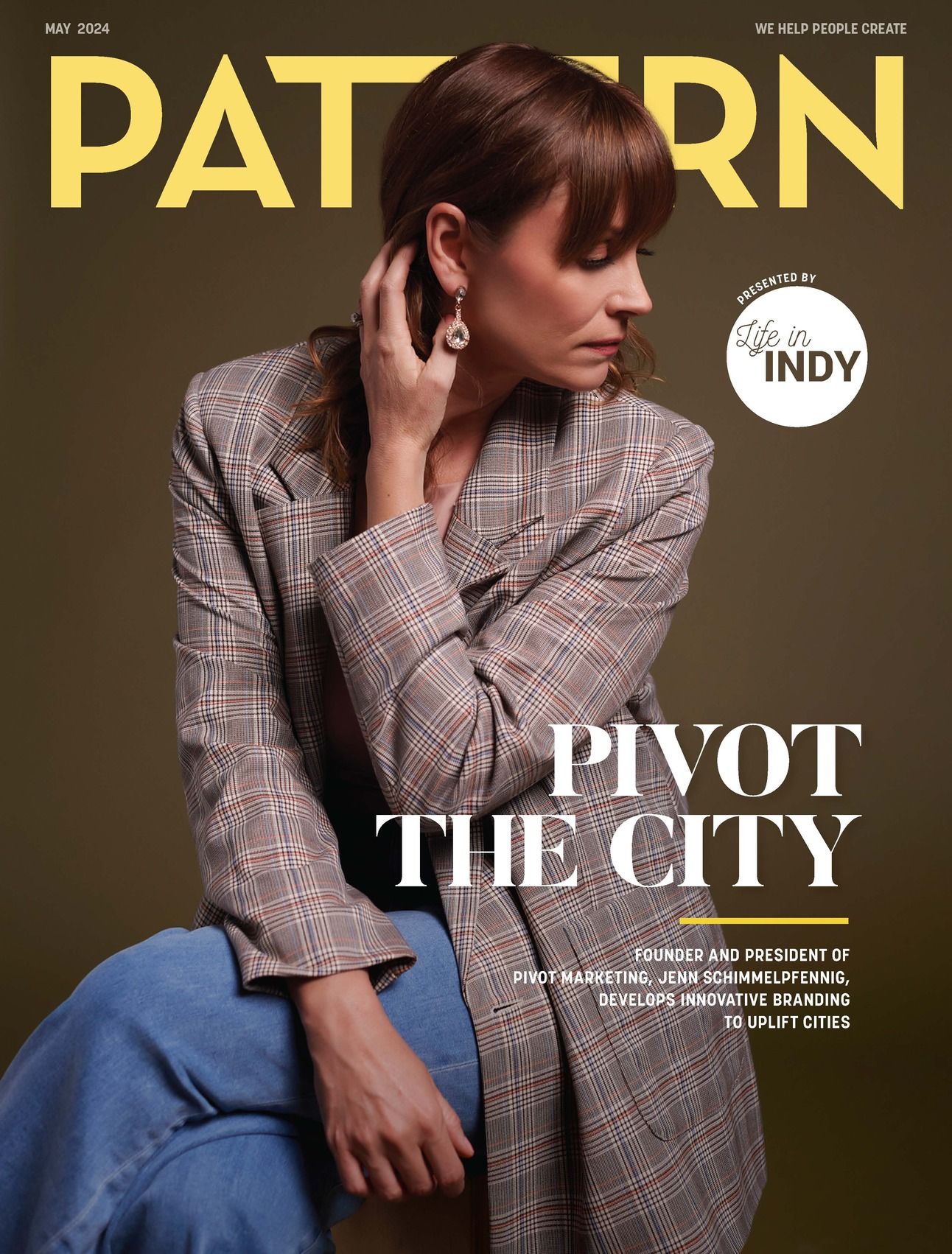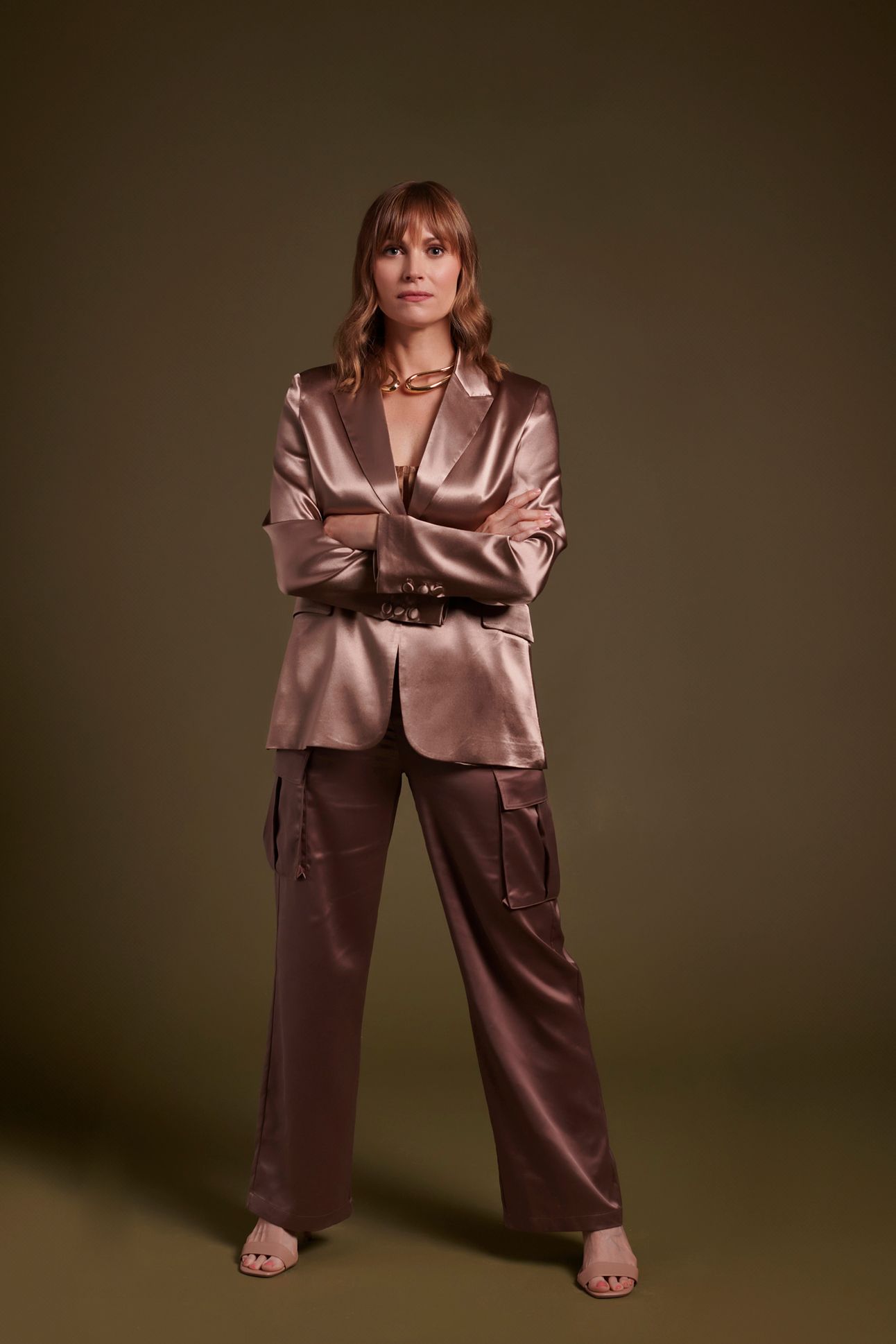
Pivot the City: Founder and President of Pivot Marketing, Jenn Schimmelpfennig, develops innovative branding to uplift cities

Photography by Esther Boston, style by Katie Marple, hair and makeup by Jessica Winchell, clothing from Good Neighbor
Schimmelpfennig means shiny penny in German, and Jenn Schimmelpfennig will tell you that the meaning is a lot more adorable than its pronunciation. And now that we’ve got that out of the way, we’re ready to dive into a slice of the conversation we had with Schimmelpfennig about growing up, starting a business, and kicking ass in Indianapolis as founder and owner of Pivot Marketing.

Polina Osherov: Tell us about what you were like as a child and a little bit about your family.
Jenn Schimmelpfennig: I was the oldest child, which probably surprises no one. Very achievement-minded, very competitive with my little brother. When I was little, we lived in Chicagoland. And my dad worked as a stockbroker, so he took me to work with him a few times. And that was just so cool. Going up in one of the towers in Chicago and looking out. That was my introduction to the business world, and I fell in love with it right away.
My parents moved down to Indy and got divorced when I was seven, so that was pretty formative as well. So I was also the mediator sometimes and took on that posture of everything's going to be all right, I’ve got this. And I think I carried that through life a bit. It was a toughening up, combined with that achiever mindset, that set me on a path of wanting to do something where I had some control.
PO: What were your favorite subjects in high school? And then what was life like right after high school for you?
JS: I'll tell you what I didn't like. I hated calculus. I hated AP biology, AP chemistry. Yet I felt like I had to take those AP classes. But I should have probably filled my schedule with art, choir, band, and English. I love writing. I love art. All of that was where I wanted to be.
I ended up going to Notre Dame. It was a beautiful campus, and I liked the other kids who were really pushing themselves there. It was a sink-or-swim kind of place. And I liked that stuff.
PO: And then you graduated, had a job or two, and then at twenty-five, you were like, fuck it, I’m starting my own company.
JS: Yeah. One of the first things I did was run an art gallery in this building (the Stutz) before it was renovated. I mean, we know each other from way back, but it was called the Stutz Art Gallery. Oh, man. Working with artists every day was a super fun job. First Fridays started during that time across the city. It was a really exciting time to be in the gallery world.
PO: I know exactly what you’re talking about. It was such a great time for Indy’s art scene. Do you ever look back and wonder what changed?
JS: There were, a lot of factors. I think that the recession hit and was a really tough time for a lot of people. Also, I think people move around. Artists are nomads by nature. I think the city, you know, maybe could do a better job supporting the arts. But overall, I think it was just a natural occurrence that probably happened in a lot of mid-sized cities, unfortunately. But I enjoyed it. It was fun while it lasted.
And then, yeah, at twenty-five, I decided to start a branding firm.
PO: What prompted that? I'm sure there was a thought process. You're a planner. So what was the run-up to that?
JS: Yeah, yeah. At the time I was working for a company that’s now called Tactive. I had built a book of business that fell outside of the scope of what the company did, and my bosses told me as much. But then they encouraged me to pursue it anyway.
So that's what I did. They started as ninety percent owners, and over eighteen years I bought all the shares, which makes me the sole shareholder now.

PO: What's been your favorite campaign that you guys have done?
JS: Well, there's one we worked on together—No Mean City—that was a favorite. That was a great campaign.
PO: Almost ten years have passed since No Mean City, so for those folks that don't know what it was, please describe it.
JS: No Mean City was essentially a way to tell the real stories of Indianapolis and attract people who lived all over the country to move here or to move back or to stay here. So a talent retention campaign. But we approached it like a publication and a documentary series, and that's, of course, what we worked on together, identifying those stories and telling them in really interesting ways.
What I loved about it was we didn't try to change anything or sugarcoat anything about Indy or give it some cheesy brand or tagline. You know, it just was what it was. It was a very confident campaign and very sexy because of the photography, storytelling, and videography. All of which was a departure, I think, for Indianapolis in its taste.
It still comes up for me every once in a while. A couple of months ago, someone reached out to me and said that they had moved here because of No Mean City because they saw themselves here in a way that they hadn't in other places. And that meant a lot to me.
PO: I love it. What's your favorite city to visit?
JS: I don't know about favorite. But I've been spending a lot of time in St. Louis, and I just think it's a really interesting city. It's really old. There's a lot of different neighborhoods, a lot of their public institutions are free. Their zoo is free. Their art museum is free. There are all these places you can just kind of pop in. The food's great. I've been spending a lot of time there.
I know St. Louis would not be the answer anybody would probably expect, but it's a fun city. So is Denver, I've been spending more time there too.
PO: Because you've worked on city brands and that's kind of a specialty for Pivot, do you think Indy will ever figure out its brand? Does it need to?
JS: You can't just invent a brand out of nothing. You've got to look for what people already say or think about it, who is here and who is elsewhere. And then what do you want to be true and how can you look for overlap between those two things? Because it still has to be truthful. It can be aspirational, but it has to be based on reality.
PO: Then what? Let's say there's a foundation. How does it grow?
JS: We have to deliver on it in every way. It has to be part of your city.
For example, if design is going to be one of your core values as a city, well, then that needs to come through in your architecture, your fashion, every single aspect. Otherwise, it's inauthentic. You're not really funding it, supporting it, nurturing it, and it's never going to be solved just by an ad campaign.
It has to be true already, like with the Indy Welcomes All campaign. If the people who lived in Indianapolis weren't already welcoming and accepting and progressive and a blue dot in a red state, that campaign would have never worked because people would have said, that's not true.
So it has to be true first, and then you can build on that. Sorry, I get a little fired up.
PO: All good. We've been at it for a while. It’s hard to stay impartial while discussing this. (laughs) Time for audience questions.


Samantha: What's your favorite thing about living and running a business in Indianapolis?
JS: Oh, man, I love our specific location where our office is right across from Bluebeard and Amelia's and Calvin Fletcher's. And it's been the same people running all of our businesses in that area for over a decade. So that's really neat to have a community of other business owners. And then we see a lot of the same folks who live in the neighborhood. And so being right there and being on the trail—I never wanted to be in a tower or in a building where I had to take an elevator. It was just a quirky thing I didn't ever want to do or park in a parking garage, which eighteen years ago was very unusual. It was like, why wouldn't you want to be in a tower and take an elevator? That was prestigious.
And most of the ad agencies were in buildings like that at that time. I said, no, I want to be more face-to-face. Because if we're removed from the city and the people of the city, our work is going to be stale, inauthentic. We're just going to have people living wherever and driving downtown instead of having people who live downtown, work downtown, and interact with the people of Indianapolis. So those are some of my favorite things about Indy.
Emily: I was wondering, what qualities do you look for in a client that you want to work with?
JS: Yeah. I look for a willingness to change. Like, to be open to change, to be open to being led by people who know what they're doing in our area. We've been fortunate to have lots of people who've trusted us with their companies and their brands.
You know, I used to say no douchebags and no debutantes. I just want to work with people who, like our team, are very inquisitive and well rounded and hardworking and trying to do something with their company or their nonprofit. Working with good people to make their brands more beautiful and effective. It was fun.
PO: You talk about how marketing should be used for good. What does that mean to you?
JS: You know, it's interesting because it's shifted a little bit. Not that it shouldn't be used for good, but now that we're focusing on branding, it's evolved a little bit for me in terms of the way it plays out. But really what it means is I have to be able to believe in whatever it is I'm working on, and my team needs to be able to believe in it, because marketing and branding, at the end of the day, is really manipulation.
I mean, all of advertising, all of photography, all of this is manipulation in some way. You're tapping into something very deep in someone's psyche to get them to do something or think something or act in a certain way. That's a big responsibility, and I don't take that lightly. I don't want my team to take that lightly.
That's how I look at it. You're manipulating people. You better have a real good reason and a good conscience about doing that.
PO: It's a good, responsible approach. I like that. It's great to talk to you.
JS: This was a lot of fun. Thank you!

Stay Connected

PATTERN is a 501(c)(3) public charity. Your donations make our work possible.
Subscribe to our Print Magazine and support creatives across the state.
Love our work? Hire us! We’re obsessed with storytelling and design. Email [email protected] with details for a quote.
This story was made possible thanks to the generous support of our friends at Life in Indy.

